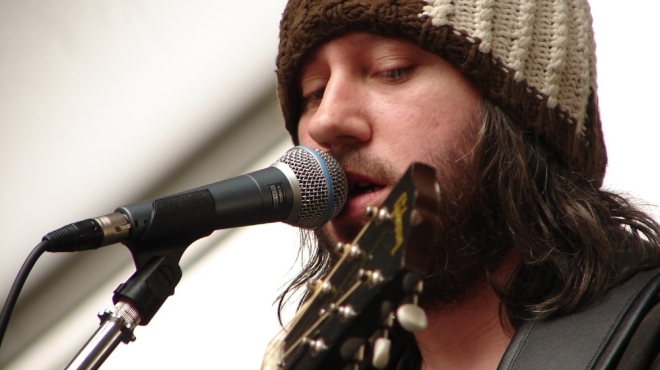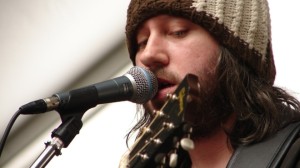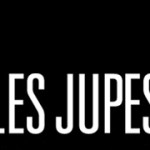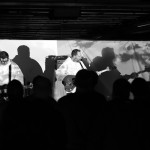Ten years ago this week, Elliott Smith died – too young, at 34, the cause of his death understood to be suicide. The impact of his death was felt keenly by a legion of fans that has continued to grow steadily since the songwriter passed away, and every year musicians find ways to mark the anniversary and remind people of Smith’s passing. Smith’s struggles with depression and drug abuse were well documented, and yet they have never overshadowed the vast musical legacy that he left.
In London the tenth anniversary was commemorated by two fund-raising events. On Sunday an intimate show at the atmospheric Oliver’s Jazz Bar in Greenwich raised a chunk of change for CALM, a charity that works to reduce male suicide (the biggest killer in the UK of men under 35), and on Monday, the anniversary itself, Badly Drawn Boy headlined a small, sold-out show at Brixton’s beloved Windmill, in support of mental health charity MIND.
Both events should have been warm and poignant tributes to Smith’s memory. A collection of artists who were inspired by him played a selection of his songs and, on Monday night, some of their own work too. For those who never got to see Smith live, it was a chance to hear the songs they loved played by musicians who shared their affection for the late songwriter, from solo acoustic sets to thoughtfully arranged group performances. Unfortunately, an unhappy incident cast a bitter shadow over the sold-out show. 15 minutes into Badly Drawn Boy’s set, members of the crowd streamed out of the venue, expressing their disgust, while many of those who remained expressed bewilderment. Before his first song finished, Damon Gough had verbally abused an outspoken spectator, called him a “cunt” more than 10 times, and told him he wished he was dead.
The trouble was triggered by a heckler telling BDB to “get on with it”. Arriving late onstage, the singer mused and rambled for ten minutes over a finger-picked intro. Gough’s irreverent observations, among them that “death’s a fucking ballache”, met with early roars of laughter from the crowd, and he was effusive about his affection for his late friend Elliott Smith. However, patience started to wear thin as he told some muddled stories about the previous night’s drug use and asked the audience if they had any on them – “even Nurofen”. Some observers started to wonder what state he was in, and the first heckle came after several of Gough’s confused and repetitive attempts to get anywhere near the point of a story about meeting Beck, via numerous mentions of his Mercury prize and how friendly he and Smith had been. Little wonder, then, that he reacted so badly when a second yell, this time of “Elliott would be ashamed of you!” came from the crowd.
Incensed, Gough shouted “come here and say that!”, and the dissenter was pushed to the front to receive a string of insults. “Elliott Smith, Beck, Mercury Prize!”, spat Gough, before peppering a surly version of ‘The Shining’ – his first song of the night, fifteen minutes in – with “CUNT!” between every other line. His parting shot was “I hope you die soon”, and amidst the confusion, one customer was escorted out of the side door (apparently for his own safety) and another, who admitted making the second comment, left via the front door of his own free will, followed by others who witnessed the scene.
Some laughed. Others left in disgust. It was not what should have taken place at a celebration of the life and work of a musician who, for all his flaws and failures, had a reputation for his gentle behaviour to others. At Smith’s lowest professional point, in the jaws of paranoia, drug addiction and depression, he temporarily lost the ability to play his own songs and faced hecklers and reviewers predicting his death after bungled live performances; nonetheless, he was not known for taking his frustration out on his audience.
Gough’s fans have argued that, as a friend of Smith’s, he was rightly offended by the heckler’s words. That’s certainly true – it must hurt to hear someone you don’t know pass instant judgment on what your deceased friend might have thought of your behaviour, and the comments were cruel. But the off-the-cuff wit he opted to fill the first section of his set with (instead of his music) could have been sharpened into one hard retort before he moved on. Or he could have summoned his professionalism and ignored the comments altogether to focus on honouring his friend. Encouraging mob mentality from the audience and verbally bludgeoning his microphone-less opponent for several minutes coloured him as a bully. Announcing onstage at a charity show that he wasn’t being paid, in the context of his other actions, was churlish. And saying he wished someone dead, at a memorial show, was staggeringly ignorant. It’s certainly true that his name on the bill sold out the venue and raised a lot of money for charity, but that’s not a “get out of jail free” card – it can’t be. We cannot applaud or excuse someone’s mean-spirited and abusive behaviour simply because his name shifts tickets. He did not organise the event; promoters, venue staff and musicians worked for weeks to plan it, and kept their egos out of the equation. In one long outburst Gough changed the atmosphere of the night irreparably.
Others have pointed out that, if you’ve seen Badly Drawn Boy before, you know that his shambling banter is part of his set. Perhaps, but last night’s show was not about him, and the audience was as much an Elliott Smith crowd as a Badly Drawn Boy crowd. (Either way, last night’s antics were not out of character for him, judging by recent years’ incidents before Los Angeles and Northampton crowds.) He headlined a night to support a charity and commemorate a dead hero, loved not just by him but by the packed crowd who came from far and wide and spent nearly £20 per head to attend. The other artists on the bill selected their own work to complement the Elliott Smith songs they had learned. Gough’s announcement that playing his own stuff was what Smith would have wanted was blown out of the water by his ranting sabotage of his own music, and his actions split the crowd and alienated people. He turned a tribute into a tantrum, and became the focal point of the night for all the wrong reasons. In this case, the moral high ground was very much beyond his reach.
The crowd division caused by Gough’s outburst remains. It was clear, speaking to fans on the night, that some were devotees who came to hear a night of Elliott Smith songs and remember him, while others were loyal BDB fans who thought he was completely justified in his actions – as the trouble started, one strident voice in the crowd shouted, “we love you, mate, you’re a legend”. In the cold light of day, opinion is divided on whether the heckler was wholly to blame for his words, designed to sting and shame, or whether Gough surrendered the moral high ground to the heckler by responding so brutally and, to some ears, proving him right. Would Elliott have been ashamed? It feels crass and unfair to dwell on what a man now long dead might have thought of someone’s actions (and no doubt this is partly what provoked Damon Gough’s fury). But it is fair to suggest that he might have been disappointed that a night born from a sincere respect for his music turned in one moment to ugly tension and prompted many to leave early.
Yet BDB’s prolonged outburst was not the most powerful legacy of the weekend. The night before, without the fanfare of a major headliner, the Greenwich musicians raised £235 for CALM, leaving professional and personal egos at the door to remind people of what Smith’s music had meant to them; their expressive and faithful performances brought it intoxicatingly back to life for one Sunday evening. Up until Gough’s onstage eruption, the artists involved in Monday night had succeeded in doing the same, and the work of everyone involved on Monday night raised in the region of £2000 for MIND. Touchingly, Either/Or, XO and Figure 8 producer, Tom Rothrock (who also worked with Beck and with Badly Drawn Boy – the original point of Gough’s garbled tale) made a surprise appearance to speak about Smith. Putting aside the disappointing tableau onstage, it was indeed a fond farewell; a reminder of how enduring Elliott Smith’s legacy is, and how much his music continues to inspire people, whether they knew of him in his lifetime or came to him in the years after.





